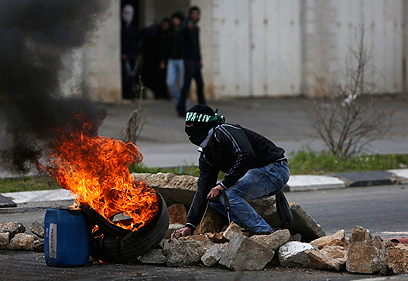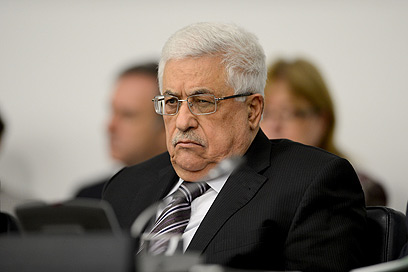The current unrest in the territories is being orchestrated, to a large extent, by the Palestinian Authority. One of the reasons for this unrest is the weeks-long prisoners' strike, under the guidance of Fatah. If a prisoner dies in an Israeli jail, the masses take to the streets. But it would be a mistake to think that it is only the PA's initiative that motivates the masses. As was the case in most uprisings in recent years, there are a number of reasons for the Palestinian unrest.
The first is the dire economic situation in the territories, which affects not only young, unemployed people, but also Palestinian police, who have not received their salaries and are therefore not present on the ground to restrain the masses. It is important to note in this respect that the Israeli government is largely responsible for the PA's dire economic situation, as it has refused to transfer tax revenues to the PA after Abbas asked the UN to recognize the PA as a state.
Another reason for the mounting tensions is Hamas' success in the aftermath of Operation Pillar of Defense. Hamas' propaganda presents the Israeli concessions in the framework of the agreement that ended the conflict as a great achievement of the armed resistance. Fatah, which calls for non-violent resistance, also hears the statements coming out of Gaza. Meanwhile, the frustration in the West Bank is growing due to the fact that the PA and Hamas have yet to reconcile.
Fatah, which is the Palestinian Authority's political base, fears losing its dominance over the West Bank, so it must appear to be just as militant as Hamas in Gaza. The way to do this is to launch an intifada without the use of live ammo or explosives. Such an uprising is meant to allow the Palestinians to gain diplomatic achievements without losing the world's sympathy as a result of the murder of Israelis.
There is another important reason for the unrest: The acts that are referred to in Israel as "price tag" are actually nationalistic crimes. This is also how the government defines acts perpetrated by Jewish extremists and terrorists. The frequent clashes between Jews residing in West Bank outposts and Palestinians also add to the already tense atmosphere – perhaps even more.
The reason the unrest has intensified recently is that the Palestinians want to create an explosive situation ahead of President Obama's upcoming visit to the region. Abbas and Jibril Rajoub did not invent anything here. In the 1970s Henry Kissinger developed a theory according to which international agreements are easier to reach in a tense atmosphere. Kissinger implemented this theory when he served as national security advisor and secretary of state in the Nixon administration, when agreements were needed to end the Yom Kippur War. He had a fair amount of success, and now Abbas is interested in making a similar move aimed at creating an atmosphere that will force Netanyahu and Obama to discuss the Palestinian demands –even if they do not plan on getting actual results.

West Bank riots (Photo: Reuters)
Through this "quiet intifada," Abbas is looking to force Obama and Netanyahu to creating an outline for the peace process that is more or less acceptable to the PA. The plan will be implemented by new Secretary of State Kerry.
This is more or less the story behind the current unrest and why the masses will take to the streets again today (Monday), despite the fact that a Palestinian representative was present during the autopsy performed on the body of Arafat Jaradat, the prisoner who died in Megiddo Prison. It is safe to assume that Abbas, like the Israeli government, fears that things will get out of control, because he also views the masses as a potential danger.

Does not want things to get out of control. Abbas (Photo: AFP)
It is clear that Abbas and his aides do not want a violent and lethal intifada. The memories of the second intifada are restraining the street, and this is why most of the rioters are young people who were babies or children during the second intifada. Most of those who remember the events that transpired at the beginning of the millennium are not rushing to the streets.
The Israeli government realizes that the punitive measures it took against the PA in response to the UN bid further isolated it from the international community and gave the Palestinians a propaganda weapon in the international arena. These measures also made it easier for the PA to incite the Palestinian public in the West Bank. Those who will suffer most from the unrest are the Jewish settlers throughout the West Bank, as well as the IDF soldiers and Border Guard officers who sustain the stone and Molotov cocktail salvos.
For now, this is not an intifada. The unrest has yet to develop into a popular uprising and does not have the characteristics of the first and second intifadas. There is no single command center that coordinates the maneuvers on the ground, and there is no widespread use of violent means. So far, the violent acts have occurred in a few villages and in Hebron – but not in Nablus, Ramallah or east Jerusalem.
However, today's unrest may turn into tomorrow's uprising. The IDF and Border Guard are much better prepared than they were in 1987 and 2000 to effectively deal with the rioters. They have developed methods aimed at avoiding civilian casualties and severe injuries to the demonstrators, thus reducing the likelihood that these protests will "explode" like the demonstrations that ignited the first and second intifadas. Let's hope the IDF's policy of restraint will prevent a "third initifada."















